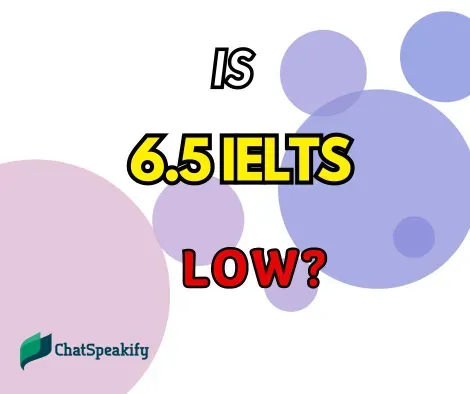A score of 6.5 on the IELTS (International English Language Testing System) is generally considered moderate. This score typically reflects a competent level of English proficiency, where the student can understand and use reasonably complex language in familiar situations but may struggle with more nuanced aspects of the language.
The decision on whether a score of 6.5 is low or acceptable primarily relies on the circumstances in which it is set. Most universities and colleges in various countries recognize students’ proficiency with an IELTS score of 6.5 and above, which is why such English skills can often be used for the following academic programs. On the contrary, highly touted schools around the globe demand students to satisfy a higher IELTS benchmark. These institutions will probably be situated in english-speaking nations such as the United States, the United Kingdom, Australia, and others. The fact remains that students are often asked to score 7.0 or more, particularly when they aspire to study in colleges that demand a high-performance level, including vital academic and social aspects.
Contextualizing IELTS Scores
1. Professional and Academic Requirements:
-
Higher Education: Many master’s and doctoral programs, especially those at prestigious institutions, require an IELTS score of at least 7.0. This benchmark indicates that the student has a strong command of English necessary for comprehending advanced academic material, participating in discussions, and producing scholarly work.
-
Undergraduate Programs: While top-tier schools might still prefer scores in the range of 7.0 to 7.5, several undergraduate programs at mid-range universities will accept a 6.5, understanding that the student might need some additional language support.
-
Certificate and Diploma Courses: Many certification or professional diploma programs, particularly those outside of top academic circles, are more lenient, and a 6.5 IELTS score is often sufficient.
2. Professional Licensure and Employment:
-
Medical and Legal Professions: Certain professions, such as those in the medical and legal fields, may demand higher IELTS scores due to the complexity of language used in these arenas. Professionals in these fields might need to demonstrate a score of 7.0 or even 7.5 to ensure they can effectively operate in high-stakes environments.
-
General Employment: For general employment opportunities, especially in roles that do not require high levels of specialized communication, a 6.5 might be perfectly acceptable. In fact, many employers in the hospitality, retail, and office administration sectors consider a 6.5 as indicative of a good working knowledge of English.
3. Migration and Visa Requirements:
-
Immigration Programs: Some countries use IELTS scores as part of their immigration criteria. For example, Canada and Australia have different categories under their skilled migration programs, with varying IELTS requirements. A score of 6.5 might meet the baseline requirement for several visa categories.
-
Visas and Permits: For work or study visas, the required IELTS score can vary. For example, the UK Tier 4 Student Visa requires at least a B2 level of English, which equates to an IELTS score of 5.5 in each component. However, different institutions or courses might have stricter requirements.
Enhancing Your IELTS Score
If a student or professional finds themselves with a 6.5 score but aiming for higher, several strategies can help improve their performance:
1. Focused Preparation:
-
English Courses: Enroll in advanced English language courses, either in-person or online, to systematically improve all aspects of English—reading, writing, listening, and speaking.
-
Practice Tests: Regularly take IELTS practice tests to familiarize yourself with the format and time constraints. This also helps identify weak areas that need more attention.
2. **Engaging with Native Speakers:
-
Conversation Clubs: Join English conversation clubs or online language exchange platforms like Tandem or HelloTalk to practice speaking with native speakers.
-
Media Consumption: Consume English media, such as books, articles, movies, and podcasts, to enhance vocabulary and comprehension skills. Watching news channels like BBC or reading publications like The New York Times can be particularly useful.
3. Professional Tutoring:
- IELTS Tutors: Hiring a professional tutor who specializes in IELTS preparation can provide personalized feedback and tailored strategies to tackle specific challenges.
Conclusion
While a 6.5 IELTS score is generally considered moderate and acceptable for many academic and professional contexts, higher aspirations, particularly towards top-tier universities or highly specialized professions, often require a score of 7.0 or higher. Pursuing additional study, engaging regularly with English speakers, and practicing diligently can help improve your IELTS score and open up more opportunities.
Remember, each journey towards language mastery is unique, and with the right strategies, dedication, and resources, you can achieve the score that meets your aspirations.
References:
Happy studying, and best of luck on your IELTS journey!
